
Resources
Browse our full library of in-depth resources and publications
The PacWastePlus programme team is committed to producing meaningful and valuable publications and resources that provides guidance for improving waste management in the Pacific
Search
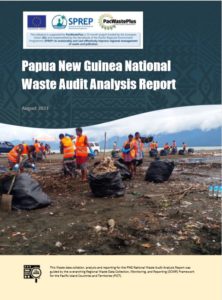
Research Report
Papua New Guinea National Waste Audit Analysis Report
This Waste data collation, analysis and reporting for the PNG National Waste Audit Analysis Report was guided by the overarching Regional Waste Data Collection, Monitoring, and Reporting (DCMR) Framework for the Pacific Island Countries and Territories (PICT).
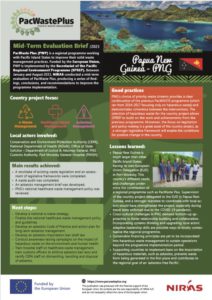
General
Mid-Term Evaluation PacWaste Plus Programme – Papua New Guinea Project Evaluation Brief
The Pacific – European Union Waste Management (PacWaste Plus) Programme has completed an external Mid-Term Evaluation. The evaluators from NIRAS International Consulting have produced a suite of products highlighting the Mid-Term Evaluation findings. This country brief highlights the mid-term review findings for the Papua New Guinea PacWaste Plus project.
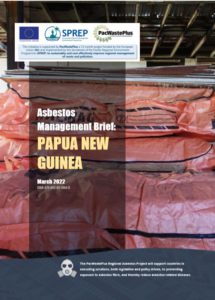
Factsheet
Asbestos Management Brief: PNG
The PacWastePlus Regional Asbestos Project will support countries in executing solutions, both legislative and policy-driven, to prevent exposure to asbestos fibre, and thereby reduce asbestos-related diseases. This document provides guidance for PNG to progress work on the development and implementation of a National ACM ban with this resource providing background information, identifying policy and legislative options available.
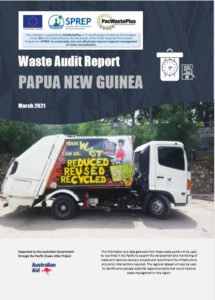
Technical Report
Papua New Guinea Waste Audit Report
The information and data gathered from these waste audits will be used by countries in the Pacific to support the development and monitoring of waste and resource recovery projects and recommend the infrastructure and policy interventions required. The regional dataset will also be used to identify and evaluate potential regional projects that would improve waste management in the region.
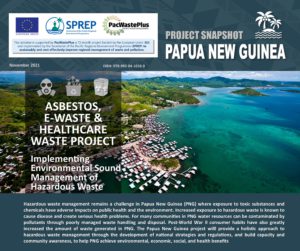
Factsheet
Papua New Guinea Project Profile – Implementing Environmental Sound Management of Hazardous Waste
Hazardous waste management remains a challenge in Papua New Guinea (PNG) where exposure to toxic substances and chemicals has adverse impacts on public health and the environment. Increased exposure to hazardous waste is known to cause disease and create serious health problems. For many communities in PNG, water resources can be contaminated by pollutants through poorly managed waste handling and disposal. Post-World War II consumer habits have also greatly increased the amount of waste generated in PNG. The Papua New Guinea project will provide a holistic approach to hazardous waste management through the development of national strategies and regulations, and build capacity and community awareness, to help PNG achieve environmental, economic, social, and health benefits.
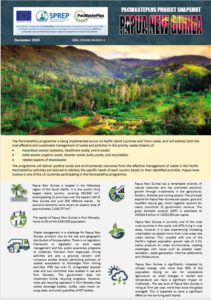
Factsheet
PacWastePlus Project Snapshot – Papua New Guinea
Waste management is a challenge for Papua New Guinea, primarily due to the size and geographic distribution of its population. There is no regulatory framework or legislation on solid waste management and few public awareness programs or initiatives. Pollution from large-scale mining activities are also a growing concern with numerous studies directly attributing pollution of coastal ecosystems to discharges from mining activities. PNG has over 21 unregulated disposal sites and two controlled sites located in Lae and Port Moresby. The government does not implement formal recycling programs. However, there are recycling operators in Port Moresby that collect beverage bottles, ULABs, used motor oil, scrap steel, and small quantities of PET bottles.
File Size: 2.5MB, 5 pages PDF document
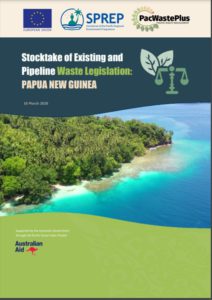
Waste Legislative Review
Stocktake of Existing and Pipeline Waste Legislation in Papua New Guinea
This report contains the University of Melbourne (UoM) team’s findings relating to a stocktake of the existing legislative environment for waste management in the participating countries, focusing on the PacWastePlus priority waste streams of healthcare waste, asbestos, e-waste, plastic waste, recyclables, organics, disaster waste, bulky waste and wastewater, and including implementing legislation for the following multilateral environmental agreements (MEAs): Waigani, Basel, Stockholm, Rotterdam, and Minamata. It also includes a stocktake of pipeline legislative initiatives in the participating countries, including an assessment of their impact and approximate timeframe for development. This report provides details on a stocktake of existing and pipeline Waste Legislations in Papua New Guinea.
File Size: 2MB, 12 pages PDF document
Newsletter Subscription
Would you like to subscribe to our quarterly programme newsletter-The Connection?
We care about the protection of your data. Read our Privacy Policy.
Newsletter Signup
To sign up to our newsletter, enter the information below and we will add you to our mailing list for all future regional and project updates.
